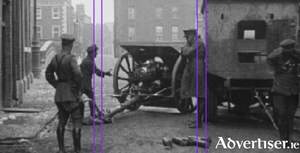Search Results for 'Lucia'
16 results found.
Play draws Nora from Joyce’s shadow

A Rare Journey celebrates the life of truly remarkable Galwegian woman, Nora Joyce née Barnacle.
A visit to Fluntern Cemetery
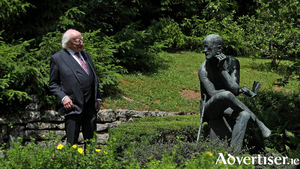
On a late August afternoon my friend John Hill drove me across the city of Zurich, climbing the suburban heights until we stopped at the gates of Fluntern Cemetery. We walked up the last incline to where, among the trees and billard-table lawns, we saw the Joyces’ grave. There was no mistaking it. Just above the grave is the Giacometti-like sculpture of the writer himself, the work of American artist Milton Hebald. There James Joyce sits, in characteristic pose, deep in conversation, head tilted, one leg resting on the other knee, cigarette poised, his slim cane delicately balanced. Someone once remarked that he held his cane like a musical instrument.
‘My dear little runaway Nora..’
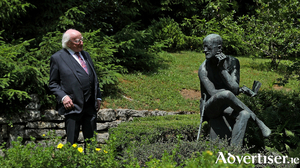
Like all widows Nora had barely time to grieve. There was so much to be done. Both she and Giorgio and her grandson Stephen, were in a state of shock at Joyce’s sudden death. Joyce suffered indifferent health all his adult life, and endured a series of painful eye operations which had little effect on his looming blindness.
A story of two fathers and two children
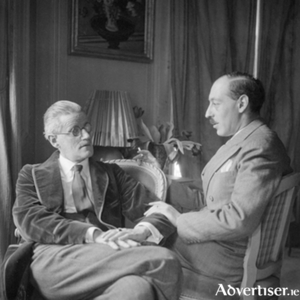
The final chapter in the history of Shakespeare and Company, the famous Paris bookshop, began with the publication of James Joyce’s Finnegans Wake, in May 1939. The shop closed in December 1941 when a Nazi officer saw a copy of Joyce’s book in its window and asked to buy it. Sylvia Beach refused saying it was her only copy, and was not for sale. The officer threatened to return and confiscate her entire stock, and left. He returned the next day and demanded she sold him the book. Again Sylvia refused, and the officer, ‘trembling with rage’ warned that he would be back that afternoon and seize all her books.
Two weddings and a broken young girl
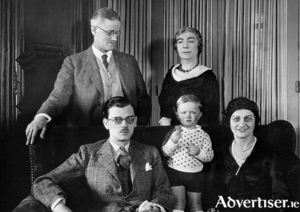
There has never been a concentration of outstanding literary and artistic talent such as that in the Paris of the 1920s. The city heaved with outrage and ecstasy at the paintings of Piccaso, and Henri Matisse, the music of Igor Stravinsky, and the wild dancing of Joséphine Baker at the Folies Bergere, and the most extraordinary avant-garde literature, where new boundaries were created by a wave of modernist writers, the most celebrated being James Joyce.
‘That Mr James Joyce is a man of genius’
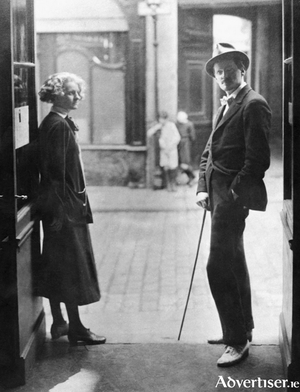
Returning to Paris after an unsuccessful and troublesome visit to Galway in April 1922, Nora and her two children, Georgio (17) and Lucia (15) became aware that fame had come to the Joyces. Three months after its publication, Ulysses was recognised as a work of genius.
A Galway story that intrigued James Joyce
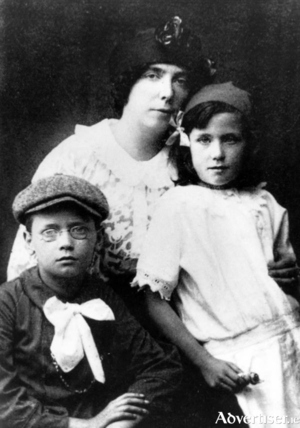
New plans projected over a 20 year period will see the inner lands of Galway harbour developed into an attractive commercial and residential area, while reclaimed land from the sea will push out harbour facilities into deep water to accommodate shipping connections to European ports and elsewhere. It is a long over due and worthwhile plan, but it pales almost into insignificance compared to the vaulting ambitions the Galway merchants schemed in the mid 19th century.
The long journey from Bowling Green was over
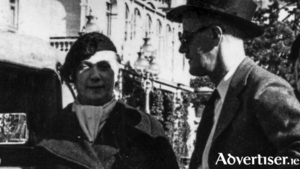
The Joyces finally arrived in Zurich on 17 December 1940 exhausted after weeks of torturous negotiations with the German, Vichy-French and Swiss authorities. They had sought refuge in Switzerland during World War I, now they hoped to do so again. To add to the stress of it all they had to leave their daughter Lucia behind in a psychiatric hospital in Brittany which was behind German lines. Joyce hoped that once settled in Zurich he could use all the influence he could muster to have her follow them to safety.
Ulysses - and gun fire in Galway
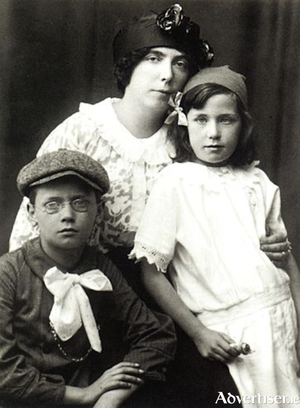
Nora’s last visit to Galway in April 1922 did not go well. Galway, as well as the country, was caught up in a deadly Civil War. The anti -Treaty forces had occupied the Connaught Rangers’ Barracks, Renmore, while the pro- Treaty forces occupied the Great Southern Hotel. The Galway to Dublin train was regularly fired upon from the barracks. There were sporadic gun fights around the Custom House, and the Masonic hall, as both sides struggled for possession. It was a dangerous time and people were fearful.
